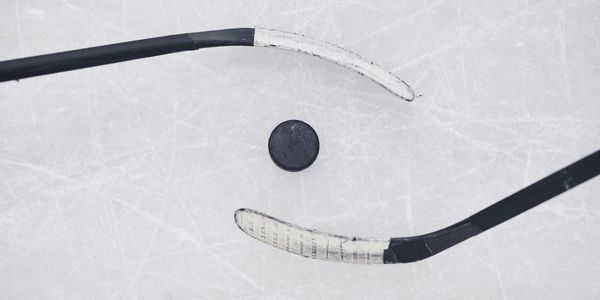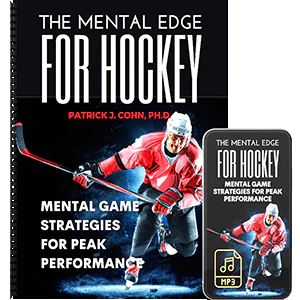
How Do You Negate Home-Ice Advantage?
Many hockey players equate home-ice advantage with away-ice disadvantage. Imagine the impact on your mind, physiology, and performance when you are at a deficit before you even start a game.
When you concede an advantage based on where the game is being played, you set a series of counter-productive consequences in motion.
Mentally, you are starting the game with a lesser degree of confidence. In the back of your mind, there is a fear or expectation that you will lose. This mindset affects your fluidity on the ice and your ability to make quick decisions and capitalize on opportunities.
Physiologically, the perception that you are at a disadvantage increases muscle tension and respiration, and causes your body to fatigue more quickly. In terms of performance, when you concede the advantage to the opposing team, it often affects your effort and intensity on the ice.
How can you negate a “home-ice” advantage? The most effective method is understanding that the home ice advantage refers to a perception, not reality.
Challenging your perception or strategizing ways to combat playing away from home is essential. For example, the impact of the crowd.
The crowd only impacts a game if your focus drifts to the stands. The reality is that you are not competing against the fans. If you learn to focus on the game and control your eyes and ears, the perceived advantage is negated.
How about the travel factor? Being on the road can bring a team closer, enhancing cohesion and trust during games. Again, the perceived advantage is negated! What about playing in an unfamiliar venue? It is crucial to realize that where you play is not as important as how you play.
When you focus on your style of play, your team’s strengths, and your game plan, it doesn’t matter where you play. Another negated advantage!
The only way for a “home ice advantage” to exist is when the away team chooses to concede the advantage. During the 2025 NHL playoffs, the Florida Panthers achieved an 8-3 road record, which helped them earn a spot in the Stanley Cup Finals.
Stanley Cup Home Ice Advantage
In the second game of the Stanley Cup series, the Panthers beat the home team, the Edmonton Oilers, 5-4 in double overtime. After their Game 2 road win, Florida forward Sam Bennett talked about the team’s playing-on-the-road mindset.
BENNETT: “We’ve been great on the road all playoffs long. We’re a confident group on the road. We enjoy being on the road, we enjoy being together, you get to spend more time together, dinners together, in the lounge together all night. And it really just brings our group together. And I think that’s part of the reason we’re having so much success on the road.’’
Wins and losses are not determined by where the game is held. Games are won or lost according to your play on the ice.
When you emphasize “how we play the game” over “where we play the game,” you neutralize the noise, the travel, the unfamiliarity, allowing you to focus your full effort and energy on the task at hand.
Games are won through your preparation, habits, and mental approach, not by the stadium’s location.
Before each road game, do a quick mental check. Ask yourself, “Am I bringing the same focus, preparation, intensity, and mentality as I do for home games?Always remember that mindset matters more than location.
Related Articles on Hockey Mental Game:
- How to Be Focused Playing in Front of Family and Friends
- Mental Preparation for Travel Hockey
- How Adam Brady Stays Motivated During the Pandemic
*Subscribe to The Sports Psychology Podcast on iTunes
*Subscribe to The Sports Psychology Podcast on Spotify
The Mental Edge for Hockey

The Mental Edge for Hockey teaches you proven and simple mental game strategies so you can overcome fear of failure, lack of confidence, slumps or poor composure, take your practice game to competition, and boost your confidence in hockey. You learn simple, actionable mental game strategies to help you perform at your peak!
I’ve worked with athletes for 30 plus years – and know the top challenges that undermine performance when you perform in games. Now you can tap into my expertise and experience in coaching hockey players on the mental game.
In this program, you’ll learn the TOP 10 mental training lessons for hockey players – the same strategies I teach one-on-one athletes I coach on the mental game. My clients pay thousands of dollars for personal coaching, but now you can have the same strategies to improve your mental game – at a fraction of the price.
READ MORE NOW | GET DIGITAL NOW
Dr. Patrick Cohn helps athletes and teams worldwide from a variety of sport backgrounds improve mental toughness for sports. He’s helped junior to NHL hockey players improve their mental toughness.
As the president and founder of Peak Performance Sports (Orlando, Florida), Dr. Cohn is dedicated to instilling confidence, composure, focus, and teaching powerful mental game skills to help athletes, teams and corporate professionals perform at maximum levels.
Dr. Cohn also teaches sports parents and coaches of young athletes how to help athletes achieve peak performance through sports psychology training. In addition, he teaches his mental game coaching system, the MGCP certification program (Mental Game Coaching Professional) to qualified coaches, trainers, and sports psychology students in training.